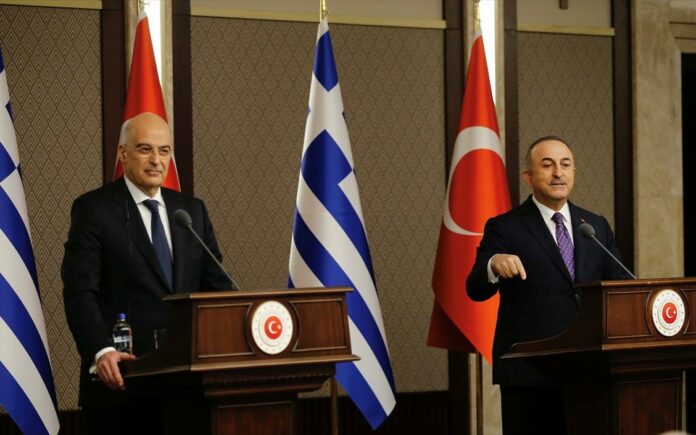A closely watched meeting in Ankara on Thursday between the visiting Greek foreign minister and his Turkish host generated “sparks” during a subsequent press briefing, with the first real contacts in the past year and a half of heightened tension in the east Mediterranean and on shared borders leading to frank comments in public – ones usually reserved for closed-door exchanges.
In terse but outwardly polite reply to a comment by Turkish Foreign Minister Mevlut Cavusoglu over “totally acceptable accusations” uttered minutes earlier by his visiting counterpart, Nikos Dendias, the latter subsequently specified:
– Greece’s islands host military units because they are “threatened”. The “threat”, in this case, according to Athens, are repeated threats of aggression and intimidation by official Ankara.
– Turkish military aircraft have engaged in roughly 400 over-flights of Greek territory (isles), not just maritime regions.
– There is no “Turkish minority” in Greece’s northeast Thrace province, but rather a Muslim minority. Dendias here cited the 1923 Treaty of Lausanne, which refers to a “Moslem minority”. In a slightly “barbed” response, Dendias said he believes Turkey is a signatory of the landmark, multinational treaty that formed the basis of the modern Turkish state’s boundaries.
– For Turkey to become a full member of the European Union, it must accept the UN Convention of the Law of the Sea (UNCLOS). Dendias, speaking in the middle of the grandiose presidential palace in Ankara, and with Turkish leadership watching, said UNCLOS has not only been signed and ratified by all EU states, it has been signed by the EU as a political entity.
– Greece will not accept “lessons” from Ankara on the thorny issue of migration. Dendias reminded of the organized attempts by third country nationals to breach the border on the Greek-Turkish frontier – separated by the Evros/Maritsa River – in February and March 2020. Athens and many other western countries at the time pointed to an organized attempt by the Erdogan government to reignite a migration crisis in Greece and the EU.
Other “discussion points” raised by Dendias before a Turkish audience included the fact that a standing “casus belli” not rescinded by Turkey, over Greece’s right to extend its territorial waters, “is illegal; a controversial Libya-Turkey maritime deal is also illegal; weaponizing would-be migrants is illegal.
The forthright statements, without reporters given time to ask press questions, came after Turkish President Recep Tayyip Erdogan received Greece’s top diplomat, an extraordinary development given that the latter usually meets with head of states or government.
In a later Tweet, in Greek, Dendias noted that “…Greece is ready to gradually commence a positive agenda with Turkey …This doesn’t mean the abandonment of international law, of the European acquis. The EU is not a third party; it is our family, the proudest example of co-existence of states in history.”














